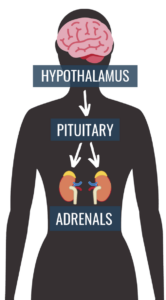[vc_row][vc_column width=”1/6″][/vc_column][vc_column width=”2/3″][vc_column_text]Elevated blood pressure predisposes individuals to cardiovascular disease and
increased risk of cardiac events, including stroke and myocardial infarction (heart attack). According to the Centers for Disease Control and Prevention as of 2021, the prevalence of hypertension increases with age, with a rate of 22.4% among adults aged 18 to 39, a rate of 54.5% among those aged 40 to 59, and a rate of 74.5% among those aged 60 and older.
Primary or essential hypertension has no direct identifiable etiology, although genetics, suboptimal dietary intake, and other factors, such as sedentary lifestyle and obesity, are believed to be involved. In contrast, secondary hypertension is caused by other disease processes, including renal or endocrine pathophysiology.
Patients may unknowingly begin to trend toward hypertension without any overt
symptoms before diagnosis. This highlights the importance of regular blood pressure monitoring. When present, symptoms may signify more severe hypertension, and include headache, fatigue, vision problems, chest pain, and arrhythmia.
Nutrition and lifestyle intervention serve as important facets of care in preventing and ameliorating hypertension. You can lower blood pressure through the maintenance of healthy weight, increased physical activity, stress management techniques, and adoption of a heart-healthy diet, such as the Mediterranean diet.
Additionally, nutrients that support vasodilation, healthy endothelial function, and blood pressure regulation can be emphasized through diet or supplementation.[/vc_column_text][vc_single_image image=”2025″ img_size=”full” alignment=”center” onclick=”custom_link” img_link_target=”_blank” link=”https://kingdomhealthcape.com/2021/05/a-functional-approach-to-high-blood-pressure/”][vc_column_text]
Action Steps to Support Healthy Blood Pressure Levels
Lifestyle Intervention
- Regular physical activity to support healthy cardiovascular function and a healthy body mass index (BMI).
- Stress management practices, such as breath work, meditation, and yoga to
modulate sympathetic response and tone.
Therapeutic Diet and Nutritional Considerations
- Consumption of a heart healthy diet such as the Mediterranean diet or dietary
approaches to stop hypertension, also known as the DASH diet. - Support blood pressure levels through intake of magnesium- and potassium-rich foods:
o Spinach
o Kale
o Swiss chard
o Pumpkin seeds
o Almonds
o Beet greens
o Quinoa
o Black beans and lima beans
o Tuna and salmon
o Dark chocolate
o Avocado
Supplement support based on practitioner guidance:
- Hibiscus tea
- Hawthorne extract
- CoQ10 with lipoic acid
- Magnesium Taurate
[/vc_column_text][vc_column_text]
Final Thoughts
[/vc_column_text][/vc_column][vc_column width=”1/6″][/vc_column][/vc_row]


 The gut is one of the first steps to address in healing from any illness. The gut encompasses so much – digestion and nutrient assimilation, gut microbiome, gut/brain axis, and lots of inflammation can stem from the gut!
The gut is one of the first steps to address in healing from any illness. The gut encompasses so much – digestion and nutrient assimilation, gut microbiome, gut/brain axis, and lots of inflammation can stem from the gut! Recap:
Recap: